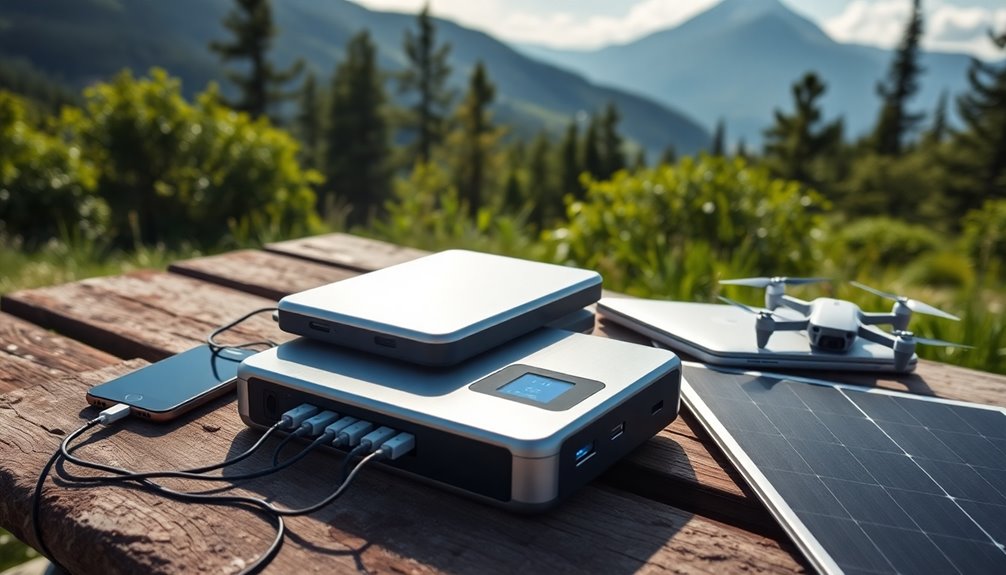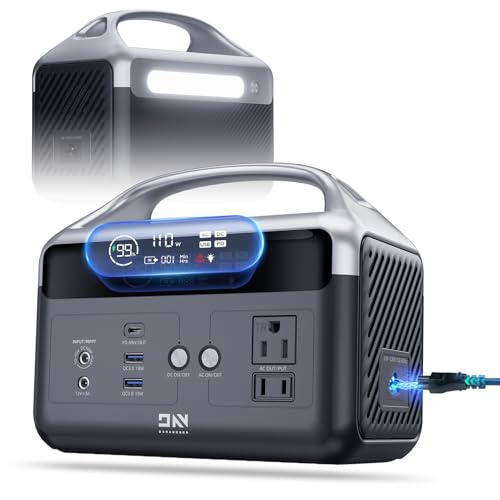I've gathered the 15 best portable power stations of 2025 to help you stay powered up during your adventures and emergencies. These power stations, like the Jackery Explorer 300 and the Anker SOLIX C1000, offer great battery capacities and lightweight designs for easy transport. They feature fast charging options and multiple outputs to keep all your devices running smoothly. Whether you're camping or facing a power outage, there's a model for you. Stay tuned, as I'll guide you through the top choices and essential factors to evaluate for reliable energy on the go.
Key Takeaways
- Explore a diverse range of portable power stations with capacities from 256Wh to 1,070Wh, catering to various energy needs for outdoor and emergency use.
- Consider models like the Jackery Explorer 1000 v2 and Anker SOLIX C1000 for their high output and multiple device charging capabilities.
- Evaluate the fast recharge times, with some units reaching 80% in under an hour, ensuring quick access to power.
- Look for safety features, such as Battery Management Systems (BMS) and overload protection, to ensure safe usage of portable power stations.
- Assess weight and portability; lightweight options like Bailibatt 300W enhance ease of transport for outdoor adventures and off-grid applications.
Jackery Portable Power Station Explorer 300
The Jackery Portable Power Station Explorer 300 is perfect for outdoor enthusiasts and anyone who needs reliable power on the go. Weighing just 7.1 pounds, it's easy to carry on camping trips or road adventures. With a 293Wh lithium-ion battery, it provides 300W of pure sine wave power, making it compatible with a range of devices—from laptops to lights. I love that I can charge my phone, camera, and even run a small fan simultaneously. The quick recharge time of 2 hours to 80% via a wall outlet is a game changer. Plus, it's solar-compatible, so I can harness the sun's energy while off-grid. With a stellar 4.7-star rating, it's clear this power station has won over many users, including me.
Best For: Outdoor enthusiasts, campers, and anyone needing a portable power solution for devices during road trips or power outages.
Pros:
- Lightweight and portable design makes it easy to carry for outdoor activities.
- Versatile charging options, including solar, AC, and car outlet, for ultimate convenience.
- Multiple output ports allow for simultaneous charging of up to 6 devices, enhancing productivity.
Cons:
- Limited power output may not support larger appliances or devices requiring more than 300W.
- Recharge time can be longer when using solar power compared to wall outlet charging.
- Suggestions for improvement include the addition of Anderson PowerPole connectors and disabling auto-power off for low draw devices.
Anker SOLIX C1000 Portable Power Station
If you're looking for a reliable power source for your outdoor adventures or home backup needs, the Anker SOLIX C1000 Portable Power Station stands out with its impressive 1800W output and rapid recharge capabilities. With a robust 1056Wh LiFePO4 battery, it reaches 80% charge in just 43 minutes—perfect for those on the go. Weighing 27.6 pounds and compactly designed, it's easy to transport. I love how it powers everything from microwaves to coffee makers, thanks to its 11 ports and 2400W surge capability. Plus, the Anker app allows me to customize charging speeds and monitor usage in real time. Overall, it's been a game-changer for both camping trips and unexpected power outages at home.
Best For: Individuals seeking a powerful and portable power solution for outdoor adventures, camping trips, and home backup during power outages.
Pros:
- UltraFast Recharge: Achieves 80% charge in just 43 minutes, ideal for quick power needs.
- Versatile Power Output: Capable of powering a wide range of appliances with its 1800W output and 2400W surge capacity.
- Real-time Monitoring: The Anker app allows for customization of charging speeds and tracking power usage easily.
Cons:
- Weight: At 27.6 pounds, it may be heavier than some users expect for portable use.
- Minor Issues with Expansion Battery: Some users have experienced minor issues with the expansion battery's functionality.
- Price Point: The purchase price is around $650, which may be a consideration for budget-conscious buyers.
Jackery Explorer 1000 v2 Portable Power Station
For outdoor enthusiasts and those seeking reliable backup power, the Jackery Explorer 1000 v2 Portable Power Station stands out with its impressive 1,070Wh battery capacity. Weighing in at just 23.8 lbs, it's surprisingly portable for its power output of 1,500W, which can surge up to 3,000W. I love its versatility—two USB-C ports, a DC car port, and three AC ports let me charge multiple devices simultaneously. Fast charging is a game-changer, going from 0% to 100% in just one hour. Plus, with a lifespan of over 10 years and smart app controls, it's user-friendly and efficient. Whether I'm camping or preparing for emergencies, this power station has become an essential part of my gear.
Best For: Outdoor enthusiasts, campers, and individuals seeking a reliable backup power source for emergencies or off-grid living.
Pros:
- Fast charging capability, reaching 100% in just one hour.
- High capacity (1,070Wh) allows powering multiple devices simultaneously, including larger appliances.
- Smart app control for customizable charging modes and efficient power management.
Cons:
- Some users reported app compatibility issues with specific phone models.
- A solar charge cable is not included, requiring an additional purchase for solar charging.
- Weighing 23.8 lbs, it may be heavier for some users compared to smaller power stations.
Bailibatt Portable Power Station 300W
Looking for a reliable power source during outdoor adventures or emergency situations? The Bailibatt Portable Power Station 300W has you covered! Weighing just 4.6 lbs and measuring 8L x 4W x 6.5H, it's super portable. With a robust 69600mAh (257Wh) lithium battery, it can power up to eight devices simultaneously, making it perfect for charging laptops, phones, and cameras. The two pure sine wave AC outlets and regulated 12V DC outputs guarantee safe and efficient charging. Plus, its built-in BMS system and LCD screen keep you informed and protected. Rated 4.4 stars by users, it's ideal for camping, home use, or during power outages. Don't forget to recharge every 1-2 months if you're not using it!
Best For: Those seeking a portable and reliable power source for outdoor adventures, travel, or emergency situations.
Pros:
- Lightweight and portable design makes it easy to carry during camping or travel.
- Versatile charging options with two AC outlets and regulated DC outputs for various devices.
- Durable safety features including a built-in BMS system and LCD screen for monitoring.
Cons:
- Limited total output power of 300W may not support larger appliances.
- Requires periodic recharging even when not in use to maintain battery health.
- Warranty period of only one year may be shorter compared to some competitors.
Jackery Explorer 240 v2 Portable Power Station
The Jackery Explorer 240 v2 Portable Power Station is a game-changer for outdoor enthusiasts and those seeking reliable backup power. Weighing just 7.7 lbs, its compact design makes it perfect for hiking, camping, or RV trips. With a robust 256Wh LiFePO4 battery, I appreciate its impressive lifespan of 10 years and 3,000 charge cycles. The 300W AC and 100W PD USB-C outputs allow for simultaneous device charging, which is a lifesaver when I need to power my phone or mini fridge. Plus, the fast charging feature gets me back up and running quickly, whether I'm using AC or solar panels. Overall, the Explorer 240 v2 offers dependable performance, and I can count on it during power outages or outdoor adventures.
Best For: Outdoor enthusiasts, campers, and individuals in need of reliable backup power during emergencies.
Pros:
- Lightweight and portable design makes it easy to carry for outdoor activities.
- Fast charging capabilities provide quick recharging via AC or solar panels.
- Multiple charging ports allow for simultaneous charging of various devices.
Cons:
- Limited power output may not support larger appliances for extended periods.
- Additional adapter required for compatibility with Jackery solar panels.
- Price point might be higher compared to other portable power stations with fewer features.
Anker 521 Portable Power Station (256Wh)
If you're an outdoor enthusiast seeking a reliable power source, the Anker 521 Portable Power Station (256Wh) could be your ideal companion. Weighing just 8.2 pounds, it's lightweight and easy to carry on camping trips or hikes. With a capacity of 256Wh, it powers devices and small appliances effortlessly, and the dual AC outlets, USB-A, USB-C, and car outlet make it versatile for all your charging needs. I love its fast charging feature—charging from 16% to 100% takes only 1.5 hours! While its maximum AC output is 300W (peak 600W), it's perfect for most outdoor activities. Just be mindful of potential solar charging compatibility issues, but overall, it delivers reliable performance for my adventures.
Best For: Outdoor enthusiasts, campers, and hikers looking for a lightweight and reliable power source for their devices and small appliances.
Pros:
- Lightweight and portable design, making it easy to carry on outdoor trips.
- Fast charging capability, allowing users to charge from 16% to 100% in just 1.5 hours.
- Versatile charging options with multiple ports, including dual AC outlets and USB-C.
Cons:
- Maximum AC output is limited to 300W, which may not support higher-wattage devices.
- Some users experience compatibility issues with solar charging connectors.
- The unit has a slight power drain of 1-2% per day in economy mode, even when not in use.
EF ECOFLOW Portable Power Station Delta 2
For anyone seeking reliable power on the go, the EF ECOFLOW Portable Power Station Delta 2 stands out with its impressive 1024Wh LiFePO4 battery. This powerhouse delivers an 1800W continuous output, making it perfect for camping, RV trips, or as backup power at home. I love that it can charge from 0 to 80% in just 50 minutes and offers a peak output of 2700W. With 15 total outlets, including 6 AC and USB-C, it can handle most of my devices effortlessly. Plus, its mobile app lets me monitor and control it easily via WiFi or Bluetooth. Weighing 27 pounds, it's portable yet packs a punch, ensuring I'm never left in the dark.
Best For: The EF ECOFLOW Portable Power Station Delta 2 is best for campers, RV enthusiasts, and those needing reliable backup power for home use.
Pros:
- Fast charging: Reaches 80% capacity in just 50 minutes.
- High output: Powers a wide range of devices with 1800W continuous output.
- Mobile app control: Easy monitoring and control via WiFi or Bluetooth.
Cons:
- Weight: At 27 pounds, it may be heavier than some portable power stations.
- Noise during charging: Fans can be loud during rapid charging.
- Limited to 0% discharge caution: Lithium-ion batteries should not stay at 0% for extended periods.
Portable Power Station 600W (293Wh Generator for Home Use)
Looking for a reliable power source during camping trips or unexpected outages? The Portable Power Station 600W (293Wh) is an excellent choice. With a pure sine wave AC output of 600W and a surge capacity of 1200W, it can power up to eight devices at once. Weighing just 7.7 lbs, it's easy to transport, making it perfect for outdoor adventures. The battery recharges from 0% to 80% in just two hours, and with over 1500 charge cycles, it's built for longevity. Safety features like overload protection and a clear LCD screen enhance user experience. Customers love its effectiveness for home use and portability, making it a dependable backup during power outages or camping trips.
Best For: Those seeking a reliable and portable power source for camping, emergencies, and outdoor activities.
Pros:
- Compact and lightweight design (7.7 lbs) for easy transport.
- Fast recharging capability, reaching 80% in just 2 hours.
- Versatile charging options with multiple ports to support various devices simultaneously.
Cons:
- Limited to 600W continuous power, which may not support high-demand appliances.
- Battery capacity may not be sufficient for extended use without recharging.
- Requires regular battery maintenance if not in use for long periods.
BLUETTI AC180 Portable Power Station
The BLUETTI AC180 Portable Power Station stands out as an excellent choice for outdoor enthusiasts and those facing power outages, thanks to its robust 1152Wh LiFePO4 battery and impressive 1800W output. Weighing in at 37.4 pounds, it's surprisingly portable, perfect for camping or off-grid adventures. With 11 outlets, including four AC ports, I can power everything from lights to small kitchen appliances. The fast charging capability is a game changer—0-80% in just 45 minutes! The built-in MPPT charge controller enhances solar charging efficiency, though some users suggest improvements in solar input. Overall, this power station has earned its 4.5-star rating, offering reliability and versatility for anyone in need of dependable energy on the go.
Best For: The BLUETTI AC180 Portable Power Station is best for outdoor enthusiasts, campers, and those needing reliable power during outages.
Pros:
- Fast charging capability allows for 0-80% in just 45 minutes.
- Versatile power options with 11 outlets to support various devices from lights to small kitchen appliances.
- Sturdy construction and ergonomic design make it easy to transport for outdoor adventures.
Cons:
- Maximum solar input current is limited to 10A, which some users feel could be improved.
- Internal battery capacity may not be sufficient for long-term use without pairing with external batteries.
- Some users desire rubber port caps to protect against dust and debris.
Portable Power Station 56000mAh Battery Backup
With a robust capacity of 56000mAh, the DaranEner Portable Power Station is perfect for anyone who needs reliable power on the go. Weighing just 6.2 lbs and measuring 8.6L x 7W x 5.1H, it's incredibly portable. I love that it offers a power output of 300W, peaking at 600W, making it versatile enough to power laptops, phones, and even mini-refrigerators.
Charging is quick, too—100% in just 1.5 hours from a wall outlet. Plus, it's built to last, with over 3500 charge cycles and 12 safety features. Whether you're camping or facing a power outage, this station has you covered. With 4.3 stars from over 600 reviews, it's a reliable choice for anyone seeking portable energy.
Best For: Outdoor enthusiasts, campers, and individuals needing reliable backup power during emergencies.
Pros:
- Fast charging capability, reaching full capacity in just 1.5 hours from a wall outlet.
- Lightweight and portable design at only 6.2 lbs, making it easy to carry on outdoor adventures.
- Durability with over 3500 charge cycles and multiple safety features ensuring reliable performance.
Cons:
- Limited to powering devices with a rated power of less than 300W, which may restrict some high-power appliances.
- Requires a specific charging time for solar panels or car chargers, which may be longer than wall outlet charging.
- Customer service responsiveness and warranty claims may vary based on location.
GRECELL Portable Power Station 300W (Peak 600W)
For anyone seeking a reliable and portable power solution, the GRECELL Portable Power Station 300W (Peak 600W) stands out as an excellent choice. Weighing just 4.9 pounds and measuring 9.6 by 6.9 by 6.7 inches, it's compact enough to take anywhere. With a capacity of 288Wh and the ability to power up to eight devices simultaneously, it's perfect for camping, emergencies, or road trips. I appreciate its quick recharge time of under two hours and the versatility of charging options, including AC outlets and solar panels. Plus, the built-in safety features guarantee I can use it worry-free. Overall, it's a smart investment for anyone needing dependable energy on the go.
Best For: Individuals seeking a reliable and portable power solution for camping, emergencies, or road trips.
Pros:
- Compact and lightweight design makes it easy to transport.
- Quick recharge time of under two hours and multiple charging options.
- Built-in safety features ensure safe operation during use.
Cons:
- Some units may have defects reported by users.
- Outlet placement could be inconvenient for certain setups.
- Customer support, while responsive, can be slow during peak times.
EF ECOFLOW Portable Power Station RIVER 2
Ideal for outdoor enthusiasts and those facing unexpected power outages, the EF ECOFLOW Portable Power Station RIVER 2 delivers an impressive 600W of output while weighing just 7.7 lbs. With a 256Wh LiFePO4 battery, it's designed to power up to six essential appliances simultaneously, making it perfect for camping trips or home use. I love how it recharges fully in just one hour with AC power, or you can use solar panels for a more eco-friendly option. The multiple ports, including AC and USB-C, mean I can charge everything from coolers to laptops without hassle. Plus, its quiet operation and portability make it a reliable energy companion whenever I need it most.
Best For: Outdoor enthusiasts, campers, and individuals seeking a reliable power source for emergencies or recreational use.
Pros:
- Fast recharging capabilities, fully charged in just one hour via AC power.
- Lightweight and portable design, making it easy to transport.
- Can power up to six devices simultaneously, versatile for various applications.
Cons:
- Limited ability to support high-wattage devices, which may restrict some usage scenarios.
- Solar charging cable not included, requiring an additional purchase for solar power options.
- Runtime varies significantly based on the load, which may not meet all user needs for extended use.
ALLWEI Portable Power Station 300W
The ALLWEI Portable Power Station 300W is a game-changer for anyone who needs reliable power on the go, whether you're camping, traveling in an RV, or using a CPAP machine. With a capacity of 280Wh and a weight of just 6.5 lbs, it's surprisingly compact and easy to transport. I love that it features multiple ports, including 9 AC, USB, and DC options, allowing me to charge everything from laptops to drones simultaneously. Plus, I can recharge it via AC, car, or solar, with the solar option taking just 3-4 hours in full sunlight. The built-in safety features give me peace of mind, ensuring my devices are protected while I enjoy my adventures.
Best For: Those seeking a portable and reliable power source for outdoor activities, RV trips, or medical devices like CPAP machines.
Pros:
- Multiple charging methods (AC, car, solar) provide flexibility and convenience.
- Compact and lightweight design makes it easy to transport.
- Equipped with a variety of ports to charge numerous devices simultaneously.
Cons:
- Limited to a 300-watt output, which may not support high-power devices.
- Some users suggest the need for a custom carry bag for easier transport.
- Solar charging efficiency depends on direct sunlight availability.
EF ECOFLOW Portable Power Station RIVER 2 Pro
If you're someone who values both portability and power, the EF ECOFLOW Portable Power Station RIVER 2 Pro is an excellent choice. Weighing just 17.2 lbs, it's lightweight and easy to carry, making it perfect for camping or home backup. With a robust 768Wh battery, it can charge in as fast as 70 minutes, ensuring you're ready to go quickly. I love that it supports high-wattage devices—think coffee makers and toasters—while offering 11 outlets for all your devices. Plus, its solar charging capability means you can harness renewable energy on the go. Overall, it's a reliable, efficient solution to keep your gadgets powered up whenever and wherever you need.
Best For: Those seeking a lightweight, portable power solution for outdoor activities, home backup, or powering high-wattage devices.
Pros:
- Fast charging capability, reaching full capacity in just 70 minutes.
- Versatile with 11 outlets, supporting a wide range of devices and appliances.
- Solar charging option allows for renewable energy use, ideal for off-grid adventures.
Cons:
- Some users report inaccuracies in registering low power draws.
- Higher price point compared to some competitors in the market.
- Limited power output for extremely high-wattage devices beyond its capability.
FlashFish 200W Portable Power Station
For outdoor enthusiasts and campers, the FlashFish 200W Portable Power Station stands out as a reliable companion. Weighing just 4.07 lbs and featuring a compact design, it's easy to transport on any adventure. With a capacity of 151Wh, it powers devices like smartphones, tablets, and even a CPAP machine through multiple outputs, including USB and AC. I love that I can recharge it using a solar panel, car charger, or AC wall adapter. However, keep in mind that you can't use it while charging. Customer feedback highlights its portability and ease of use, though some users have noted limitations with larger devices. Overall, it's a solid choice for reliable energy on the go.
Best For: Outdoor enthusiasts, campers, and individuals needing portable power for small devices.
Pros:
- Compact and lightweight design makes it easy to carry on outdoor adventures.
- Multiple charging options including solar, car, and AC wall adapter offer flexibility.
- Safety features protect devices from overcurrent, overvoltage, and over-temperature.
Cons:
- Cannot charge and use power simultaneously, limiting its functionality during recharging.
- Not suitable for high-draw appliances, which restricts its usage for larger devices.
- Some concerns with battery longevity and charging capacity for bigger gadgets reported by users.
Factors to Consider When Choosing Portable Power Stations

When I'm choosing a portable power station, I think about several key factors. Battery capacity and type, power output specifications, and charging time efficiency are vital for my needs. Plus, I always consider portability, weight, and the variety of output ports to guarantee it fits my lifestyle.
Battery Capacity and Type
Choosing a portable power station involves understanding battery capacity and type, as these factors directly impact how efficiently it meets your energy needs. Battery capacity is typically measured in watt-hours (Wh), and higher capacities allow for longer runtimes. For instance, a 1,070Wh battery can power devices for extended periods, depending on their wattage consumption.
When it comes to battery types, lithium-ion batteries are the most common in portable power stations. They're lightweight, have a high energy density, and can support thousands of charge cycles, making them perfect for mobile use. However, consider lithium iron phosphate (LiFePO4) batteries if safety and longevity are your priorities. These batteries often last over 3,000 cycles at 80% capacity, considerably outlasting standard lithium options.
Charge time is another essential aspect. Some models can reach 80% charge in under an hour, while others may take several hours. Additionally, the battery technology impacts overall performance, with advanced Battery Management Systems (BMS) providing critical protection against issues like overcharging and overheating. By understanding these factors, you can choose a portable power station that best fits your needs.
Power Output Specifications
Understanding battery capacity and type sets the stage for another important aspect of portable power stations: power output specifications. These specs indicate the maximum wattage a power station can deliver, which is essential for figuring out what devices you can power simultaneously.
When I evaluate a power station, I look for its continuous output rating—like 300W or 600W—and its peak output rating. The peak rating shows the maximum surge power it can handle for short bursts, which is vital for devices that need extra power to start up.
I also consider the total wattage of the devices I plan to connect. For instance, a 600W power station can usually run multiple small devices or a single larger one, like a mini fridge. Checking the number and types of output ports is important too, as they determine compatibility with various devices, whether they're AC outlets for appliances or USB ports for my phone. Finally, I keep an eye on the battery capacity, measured in watt-hours (Wh), since it gives me an idea of how long the power station can run my devices before needing a recharge.
Charging Time Efficiency
While evaluating portable power stations, I always pay close attention to charging time efficiency, as it can make a significant difference in how quickly I can get back to using my devices. I find that some units can reach 80% capacity in as little as 43 minutes, while others may take several hours. Fast charging capabilities are a game-changer; certain models can achieve a full charge in under an hour, especially for popular battery capacities like 256Wh.
When I consider charging efficiency, I also look at how versatile the power station is. Models that support multiple charging options—like AC, car, and solar—offer me flexibility and convenience. I appreciate when a solar-compatible power station can fully recharge in about 2-3 hours under ideal conditions, as this gives me more options when I'm outdoors.
Additionally, I check if the power station includes a battery management system (BMS). These systems often enhance charging speed and extend battery lifespan, ensuring I get reliable performance over time. Ultimately, a good balance of charging speed and efficiency is essential for my on-the-go energy needs.
Portability and Weight
When it comes to portable power stations, weight and size are essential factors that can greatly influence my experience. I've noticed that these units can range considerably in weight, from as light as 4.6 pounds to over 37 pounds. This variation impacts how easy it is to transport them during camping trips or outdoor adventures.
Dimensions also matter; many compact models measure around 9.1 inches in length and 6.6 inches in height, making them easier to fit into my backpack or car trunk. I appreciate designs that include ergonomic handles or carrying straps, as they enhance portability when I need to move the unit frequently.
It's important to assess the balance between weight and battery capacity. Lighter units usually have lower capacities, like 257Wh, while heavier models may offer up to 1,070Wh—essential for extended use. For my needs, I've found that units weighing around 7.1 pounds can deliver 300W, making them suitable for various small devices. Ultimately, I prioritize finding a power station that blends portability with the power output I need for my adventures.
Output Port Variety
Choosing the right portable power station often hinges on the variety of output ports available. When I'm out camping or need backup power during emergencies, I find it vital to have multiple options for charging my devices. Stations with a mix of AC outlets, USB-A, USB-C, and DC ports allow me to power everything from my laptop to smaller electronics simultaneously. Some models can even support up to eight devices at once, making them incredibly versatile.
I also appreciate features like fast charge ports, especially USB-C PD, which notably reduce downtime for my essential gadgets. When I plug in my laptop or phone, waiting for it to charge can feel like an eternity, so this feature is a game changer.
Moreover, I look for pure sine wave AC outputs, as they guarantee compatibility with sensitive electronics. This is essential for devices like medical equipment or small appliances. Finally, I keep an eye on wattage limitations; models with peak outputs over 2000 watts can handle high-wattage appliances, which is something I really value.
Safety Features Included
Having multiple output ports is only part of the equation; safety features are just as important in a portable power station. When I choose a power station, I always look for built-in Battery Management Systems (BMS). These systems monitor voltage, current, and temperature, protecting against overcharging, overheating, and short circuits. This gives me peace of mind knowing my devices are safe.
I also verify the station has overload protection. This feature automatically shuts off the unit if the power demand exceeds its capacity, preventing damage to both the station and my devices. Safety certifications, like UL certification, are vital too; they indicate that the unit meets safety standards, which is a must for reliability.
Additionally, I prefer models with multiple safety features such as surge protection, short-circuit protection, and over-voltage protection. These features safeguard my devices, enhancing overall safety. I also keep an eye out for cooling systems or silent fans that maintain ideal operating temperatures, especially during long usage. In the end, a portable power station should not only deliver power but do so safely.
Frequently Asked Questions
How Long Do Portable Power Stations Typically Last?
When I think about how long portable power stations typically last, it really depends on their capacity and usage. Most units can last anywhere from a few hours to several days, depending on what devices I'm powering. For instance, running a small gadget like a phone charger uses less energy than a cooler. I've found that keeping an eye on the battery level helps me manage my power needs effectively while I'm on the go.
Can Portable Power Stations Be Used Indoors?
Absolutely, portable power stations can be used indoors! Imagine having a reliable energy source right in your living room or garage, powering devices without fuss. I've found them incredibly handy during power outages or while working on projects at home. Just make sure to check the ventilation, especially if it's a gas-powered unit. Using them indoors opens up a world of convenience, letting you charge your devices wherever you are!
What Is the Average Charging Time for Portable Power Stations?
I've found that the average charging time for portable power stations varies depending on the capacity and the power source. Generally, it takes anywhere from 4 to 10 hours to fully charge. Some larger models might take longer, while smaller ones can charge faster, especially if you're using solar panels. It's always a good idea to check the manufacturer's specifications to get a more accurate estimate for your specific device.
Are Portable Power Stations Waterproof or Weather-Resistant?
Did you know that around 80% of portable power stations have some level of weather resistance? I often find myself camping or hiking, so understanding their durability is vital. Most models aren't completely waterproof, but many can withstand splashes and light rain. It's important to check the specific rating before relying on one in harsh conditions. Always read the product details to guarantee you're prepared for whatever Mother Nature throws your way!
How Do I Maintain My Portable Power Station?
Maintaining my portable power station is pretty straightforward. I always keep it clean and dry, avoiding any moisture buildup. Regularly checking the battery level is essential, and I make sure to recharge it every few months, even if I haven't used it. I also inspect the cables for wear and tear. Storing it in a cool, dry place helps prolong its life. It's all about keeping it in good shape for my next adventure!
Conclusion
In a world where staying connected is as essential as breathing, choosing the right portable power station can be a game changer. Whether you're camping under the stars or facing a power outage at home, having reliable energy at your fingertips makes all the difference. As you weigh your options, remember that the best power station for you is the one that fits your needs like a glove. So, get ready to power up your adventures with confidence!
























